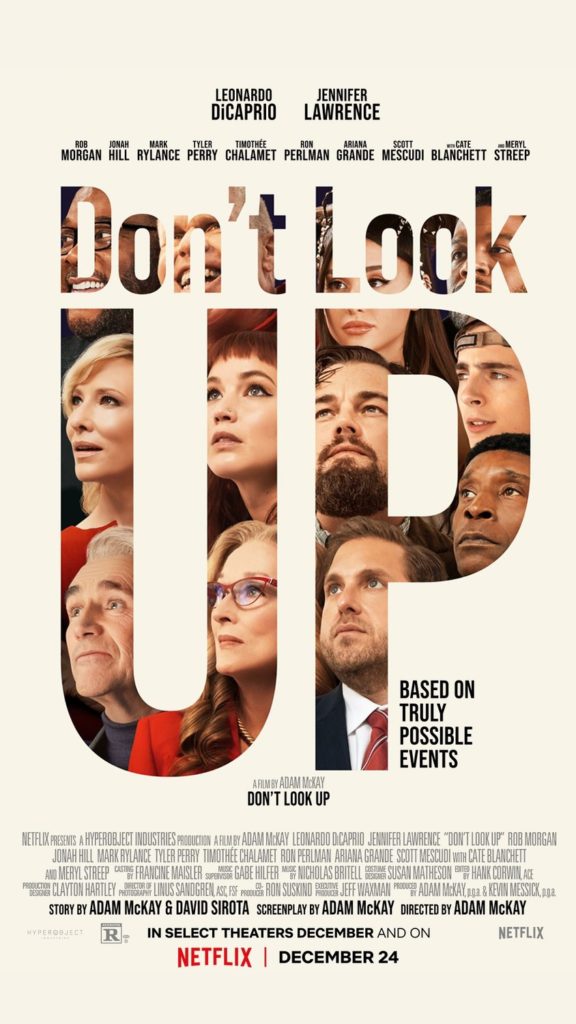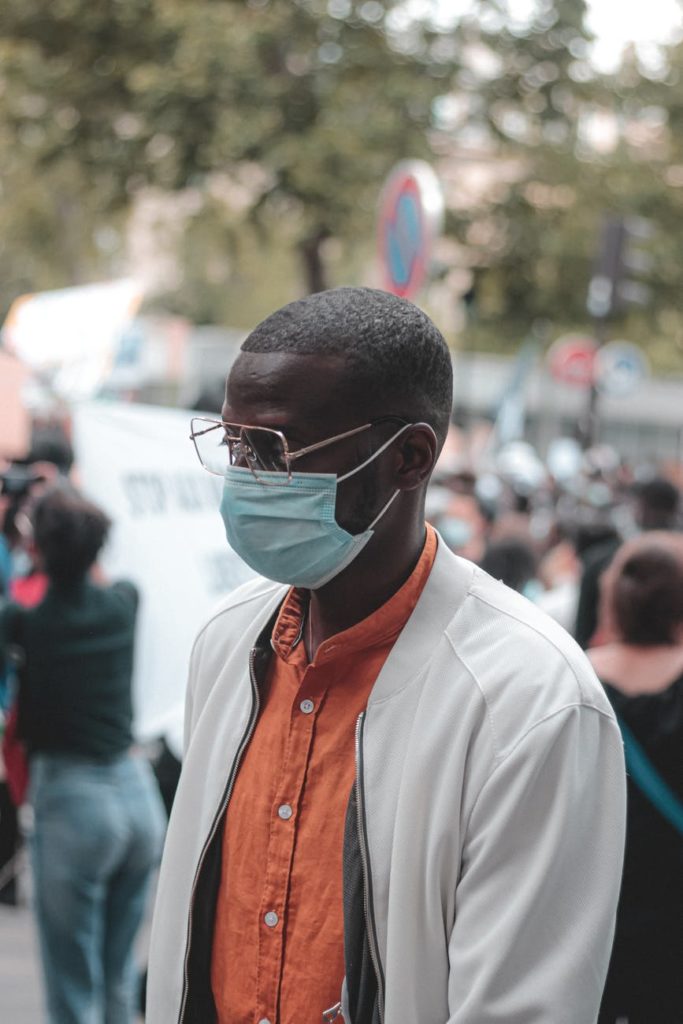writes Media Practice for Development and Social Change student Cheyanne Bryan
*The views in the following article are the personal views of the author and are not an official position of the School.*
[Contains subtle spoilers for Netflix’s ‘Don’t Look Up’]
Netflix’s recent star-studded film, Don’t Look Up, gives a not-so-subtle message about the urgency of the current climate crisis, however, many of these themes can relate to ongoing pandemic debates. Emerging shortly after the worldwide success of Squid Game, the popular streaming platform’s most recent addition is filled with political and social critical commentary that is not missed by viewers.
It has been confirmed by the film’s director, Adam McKay, that Don’t Look Up serves as a visual metaphor for the impending climate emergency, using a comet as a stand-in. Throughout the film, two scientists try to convince the government and citizens to act or else the world will experience an extinction-level catastrophic event.

As COP26, the 2021 United Nations Climate Change Conference, has passed and emphasised the fragile state of the planet, a timeline has been set to show the urgency of the current state of the world. According to Climate Clock and many climate experts, we have less than seven years to reduce emissions close to net-zero before the world is tipped to a state of no return, resulting in accelerated animal extinctions, permanently damaged ecosystems and extreme weather. This not only highlights the emergency of the receding global state, but it shows that the issue will undeniably affect many people in thought their lifetimes.
Whilst the nuances and relation to the fight for environmental development in the film parallels our own, many of the issues and arguments raised share a resemblance to attitudes towards the COVID-19 pandemic as well.
Don’t Look Up’s obnoxious message has been heavily criticised but this is now the approach many climate change activists, scientists and environmental institutions must take to show the severity of the situation. The film highlights two key points of debate that have a close resemblance to contemporary debates, both concerning climate change and COVID-19.
THE GOVERNMENT AND LARGE COMPANIES ARE AT THE FOREFRONT OF CHANGE
As COP26 and many climate change centred events have highlighted, large companies and global governments are at the forefront of driving the change. Being the biggest contributors or the ones with the most power, impactful change starts with them making improvements to their regulations and policies.
In recent years, green policies of consumerist companies have been critically examined to identify what improvements can be made to lessen the crimpling impact on the planet. Examples of this, include the UK government introducing the 5p levy for single-use plastic bags from 2015 and many fashion retailers offering money off for donating clothing or textiles back to them.

Don’t Look Up features a profit-driven tech CEO who uses data to predict that the comet, which is hurtling towards Earth, will contain valuable elements which can be used to boost his wealth if he can harvest it. Through his connections and status, he convinces the fictional US government to not act as he will share some of the profits with their elite.
In connection to the COVID-19 pandemic, recent news has shown Downing Street in breach of COVID-19 rules and regulations during the height of the pandemic. Throughout the pandemic period, ordinary citizens have been fined for not following guidelines, however, the same actions have not been implemented for those in positions of power.
DENIAL PUTS VULNERABLE PEOPLE AT RISK
When the scientists present their discovery to the US government, a timeline of six months is stated. Yet, the closer that deadline approaches, the more disastrous the effects will be, but they have enough time to try altering the comet’s trajectory and save all life on Earth from extinction.
However, this was not achieved and as the film draws to an end and the imminent collision is about to happen, a cycle of people all around the world can be seen. From people in rural African villages to those in western cities, the effect of the collision is displayed on screen for viewers to watch as the world ceases to exist.

Being two years since the coronavirus pandemic has become known to the public, many people still refuse to wear face coverings or adhere to guidelines set out with the advice from medical experts. Whilst it is known that coronavirus can be transmitted from person to person without present symptoms, people refusing to take the necessary precautions to reduce the infection rate contribute to the spike in cases. In turn, this launches a train reaction which usually only causes harm to vulnerable people. In this case, those who cannot wear a mask due to medical or physical disabilities.
The UK has surpassed 150 000 in coronavirus-related deaths since late 2019, and this number will continue to grow.
The same can be said about the environment, everyone can do a little to collectively make a big impact. Whilst the impact may not be seen by everyone, especially comfortable city dwellers, those working closely with the environment or indigenous groups that are heavily reliant on the natural world for food and shelter, are the ones that will be the most in contact with the depleting environmental state.
Whist the overt portrayal of the film’s message has angered film snobs, it vividly conveys two of the strongest similarities surrounding both the coronavirus pandemic and the climate emergency. By emphasising how large companies and governments play the biggest role in offsetting change and how vulnerable people are put at the most risk when others deny scientific facts and evidence, audiences are to distinctly see the sameness between the fictional world and our current one.


Leave a Reply